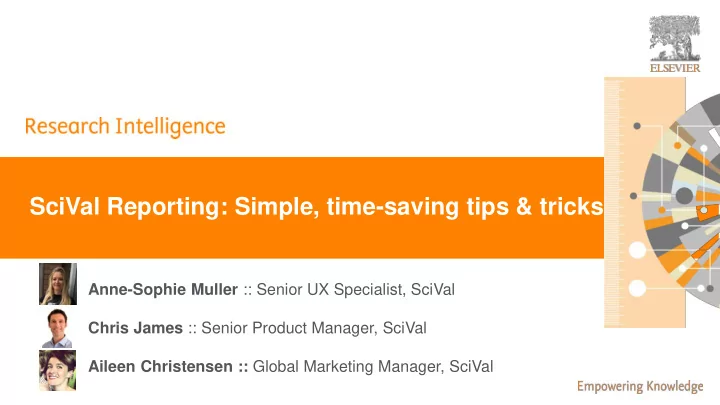

| 0 SciVal Reporting: Simple, time-saving tips & tricks Anne-Sophie Muller :: Senior UX Specialist, SciVal Chris James :: Senior Product Manager, SciVal Aileen Christensen :: Global Marketing Manager, SciVal
| 1 View presentation in full screen This session is being recorded and all attendees will automatically receive a link to the video.
| 2 Question during the presentation? Submit questions by using the “Ask a Question” feature on your screen. At the end of the presentation we will choose a few questions to answer. For the questions we do not answer today, we will respond via email in the next few weeks.
| 3 Agenda • Overview of Reporting • User testing that’s been done since release • Live demo • Future Reporting enhancements • Year range change • Questions
| 4 Join the Conversation SciVal Twitter Twitter.com/scival SciVal Facebook Facebook.com/scival Research Intelligence YouTube Youtube.com/channel/UCffqIj7ICiYccxNDPEEjHHg Research Intelligence LinkedIn Linkedin.com/showcase/10576088 Research Intelligence BrightTALK Brighttalk.com/channel/13819/elseviers-research-intelligence
| 5 Effortlessly set up and generate customized reports in SciVal • Launched in January 2017 • Save time creating the same reports on a weekly, monthly or quarterly basis • Reports are quick and easy to export and share with external stakeholders • Save and re-run periodic reports - create a snapshot of your institute and compare it over time As a research administrator, I am asked regularly generate reports with the indicators specified by my Vision and Strategy team As a Strategic Planner, I need to keep quarterly reports to undertake time series analyses As a research manager, I want to engage my academic community by creating reports of metrics of their interest
| 6 Reporting section
| 7 What is an Analysis? • For Reporting, an Analysis is a combination of metrics that makes up one chart or table Analysis Analysis
| 8 How does it work? • Most analyses from Overview and all from Benchmarking can be added to Reporting Look for the button - • “What you see is what you get” system Year ranges - Subject areas - Chart or table - Zoom - • One or more Analyses make up a Report • A folder can contain one or more Analyses and/or Reports
| 9 Icons help visualize the reports • Simple iconography gives a quick overview • View the full details of an analysis Folder = Report = Line chart = Analysis Pie chart = Bar chart = Table =
| 10 View and edit your reports Your Analyses Your Report • Ones already used in the report are light grey • Drag Analyses to arrange your Report • Drag and drop analyses to a report • Click > to view analysis details
| 11 View, add descriptions and export your report
| 12 Reporting Usability Testing November 2017
| 13 Where ? 10 customers from EU and Asia: Ireland (3), UK (2), France (2), Australia (2), Singapore (1)
| 14 Who ? • 10 People with different roles: managers (4), Research & data analysts (3), Director (1), Research administrator (1), librarian (1) • All experienced with using SciVal • All participants do reports on a regular basis (50% monthly / 50% weekly) and are main users on reporting • All of them are very enthusiastic about using reporting and giving feedback
| 15 What was tested ? • Reporting usability How do they use the product? how can we improve their experience? • Reporting needs What do they need? • Feature prioritization What is the most important? And then? • People satisfaction What do they think about SciVal interface?
| 16 Reporting Demo
| 17 Coming next • Filter on views: • Hierarchy with folders • analyses only • reports only • Possibility to copy (duplicate) reports and analyses to reuse them as templates • Possibility to merge folders and reports • Optimize / customize the report layout
| 18 And Then • Guidance • Analyses in OV module and then in Collaboration and Trends • Set customized updating frequency for the reports (and get an alert) • Create a report using a wizard • Other Export formats
| 19 Year range change • On 7 May we’ll move the year ranges in Overview, Collaboration and Trends by one year i.e. new ranges will be: - 2013 to 2018, 2015 to 2017, 2015 to >2018 etc • This happens each year around this time What does this mean for my reports? • All reports from those modules will automatically receive the new dates • Export the reports before 7 May to keep a snapshot of the data in those reports for comparison
| 20 Thank you. Stay up to date: don’t forget to follow @ SciVal on Twitter www.elsevier.com/research-intelligence
Recommend
More recommend